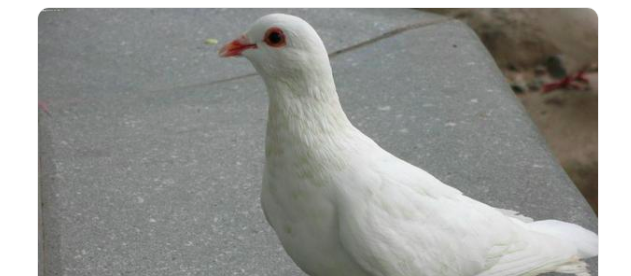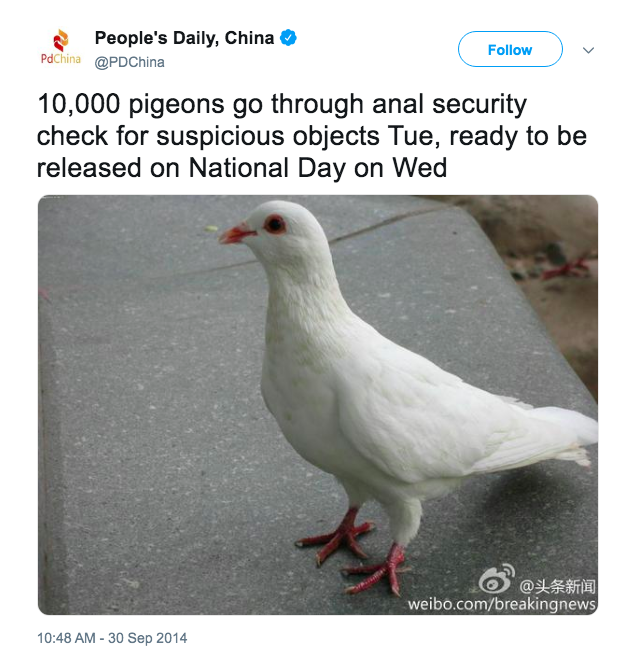The Pigeons Who Needed a Proctologist

Every year, on October 1st, China celebrates its “National Day,” marking the anniversary of the nation’s establishment in its current form. At times, most recently in 2019 to make the 70th anniversary, the government will mandate a military parade. Parts of that recent one can be seen here, originally broadcast by state-run TV station CGTN. It was a huge undertaking — tens of thousands of costumed performers, massive floats, and if you pay attention at the 1 minute, 44-second mark, a lot of pigeons. Thousands and thousands of them.
And each one probably had its butt checked.
The Chinese government, as you’re certainly aware, is an oppressive regime, and the Chinese government goes to sometimes extreme lengths to maintain power. It’s not uncommon for opposition forces to turn to violence as well, and a massive, televised parade may make for a tempting target. So when it comes to the parade, the government takes very few chances — it really doesn’t want its major propaganda endeavor to turn into a call to arms. As the Christian Science Monitor reported, in 2019, “Beijing authorities [sent] police helicopters to monitor highway checkpoints, ring roads within the city, major intersections and areas with heavy traffic, including popular tourist spots such as the Great Wall and the Summer Palace, the Beijing News said. Additionally, the capital […] mobilized 850,000 citizen volunteers to help keep a lookout in the city of about 20 million people.”
Finding a balance between celebration and security isn’t easy, but when it comes to birds, it seems like an easy call. Pigeons don’t have political leanings or particularly care about the conflicts of humans. Further, they’re a consistent part of National Day festivities; as the New York Times reported, “pigeon-keeping and flying is an old tradition in Beijing, giving rise to an entire culture and art including that of the pigeon whistle, which is attached to the bird’s leg and makes music when it flies.” And it wouldn’t be a National Day parade without them.
But in years past, they’ve provided a problem for the Chinese government: each one of them is a minor security risk. The pigeons aren’t just random birds grabbed off the street; as the South China Morning Post reported, the pigeons come from the Beijing Carrier Pigeon Association, a group of mostly hobbyists who train pigeons to return home after their flights are done. While it’s unlikely that one of these pigeon trainers (or their associates) will do something foul to the birds, there’s no guarantee. It wouldn’t be too difficult to hide an explosive device on a parade pigeon, causing carnage and ruin in the process.
In 2014, Chinese officials seemed particularly concerned about such an oddball threat. On September 30th of that year — the day before the parade — People’s Daily, China (“a famously staid Communist party mouthpiece,” in the words of The Guardian) tweeted an update about the birds (below): “10,000 pigeons go through anal security check for suspicious objects Tuesday, ready to be released on National Day on Wednesday.”

It’s unclear what the authorities were specifically looking for but it’s pretty clear where they were specifically looking. The New York Times, as reported in the above-linked article, spoke to an expert on pigeons in China (although not himself a pigeon proctologist) to find out whether these inspections would work. And yes, they probably would:
“I have not heard of pigeons released at National Day requiring security checks, but it is possible for them to carry things such as explosives,” said Mr. Yang of China Pigeon Net, a website for pigeon-fanciers. “They could carry something on their legs, under a wing, or in their anus.”
“If they carried out security checks they would find them, just like on a person when they get on an airplane,” said Mr. Yang, who declined to give his full name.
The 2014 parade when off without any bird explosions, and there are no reports of any of the 10,000 birds having anything on their legs, under a wing, or in their butts — or how China enlisted to perform the examinations.
Bonus fact: The government did the butt checks on the 10,000 birds enlisted to be part of the parade, but what about the thousands of other birds in the city? In 2019, the government cracked down on them, too. In order to protect the military planes, parade pigeons, balloons, and other celebrations in the skies (and, likely, to make it easier for those police helicopters to keep an eye out for problems), the rest of Beijing’s skies went on lockdown. As QZ reported, the government mandated that, from September 15th through October 1st, “‘in the restricted flying areas, pigeon and other bird owners must keep the animals in pens and prohibit them from flying. Pigeon associations must also supervise their members, clubs and public pens to comply with the rules,’” said the notice, warning of punishments and criminal sanctions for not obeying the restrictions.”
From the Archives: The Smugglers: Pigeons!
